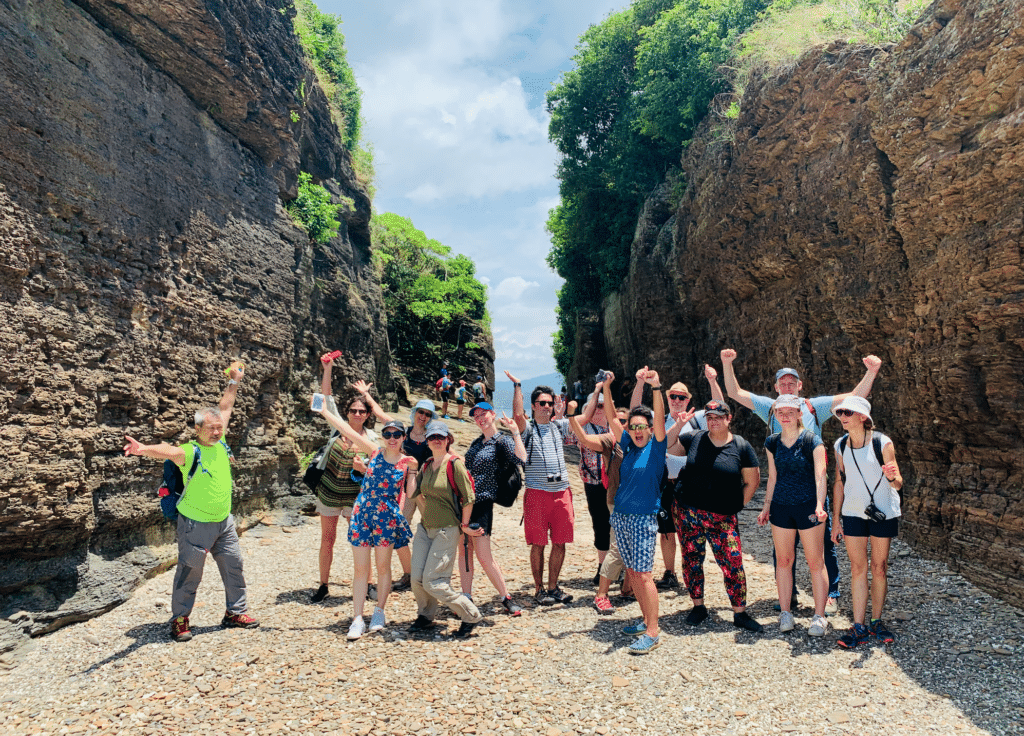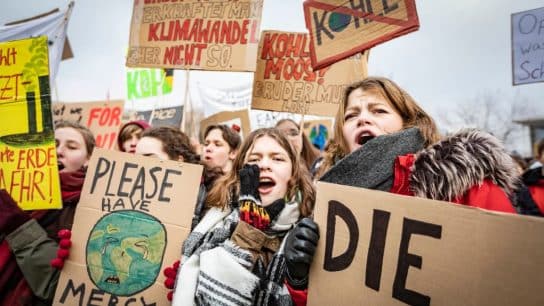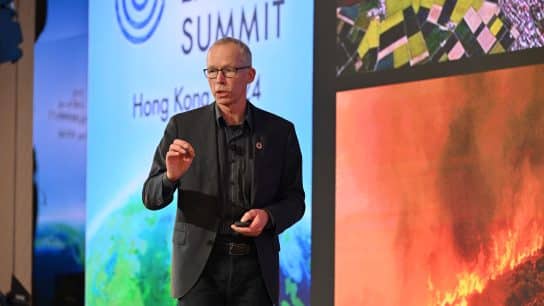In an exclusive interview with Benita Chick, CEO and founder of social enterprise Encompass HK, Earth.Org discussed the importance of educating people on sustainable development, implementing the SDGs in everyday practices, and raising awareness about topics such as equality, inclusion, and climate change through informative and engaging workshops.
—
More companies around the world are looking at ways to improve their practices while reducing their impact on the environment. Hong Kong-based social enterprise Encompass HK is educating companies and individuals in the city on the SDGs and the best ways to implement them in their daily lives.
Encompass HK
Encompass Hong Kong (Encompass HK) was established in December 2018 by Benita Chick, LGBTQ+ advocate, educator, leader, and part-time lecturer of Sustainability at the University of Hong Kong, with a mission to promote the SDGs, diversity, and inclusion. The social enterprise offers training and consultancy services to educate and support various organisations to be more diversified and inclusive while promoting the UN Sustainable Development Goals (SDGs).
Also known as the Global Goals, the SGDs are a universal call to end poverty, protect the planet, and ensure that everyone can enjoy peace and prosperity by 2030 in each United Nations member state. They are centered around six themes: dignity, people, the environment, partnerships, justice, and prosperity.
The goals go beyond economic development to encourage social development. They aim to promote and tackle other major global issues including climate change, economic inequality, innovation, sustainable consumption, peace, and equity, culminating in 17 goals, 169 specific aims, and 232 targets.
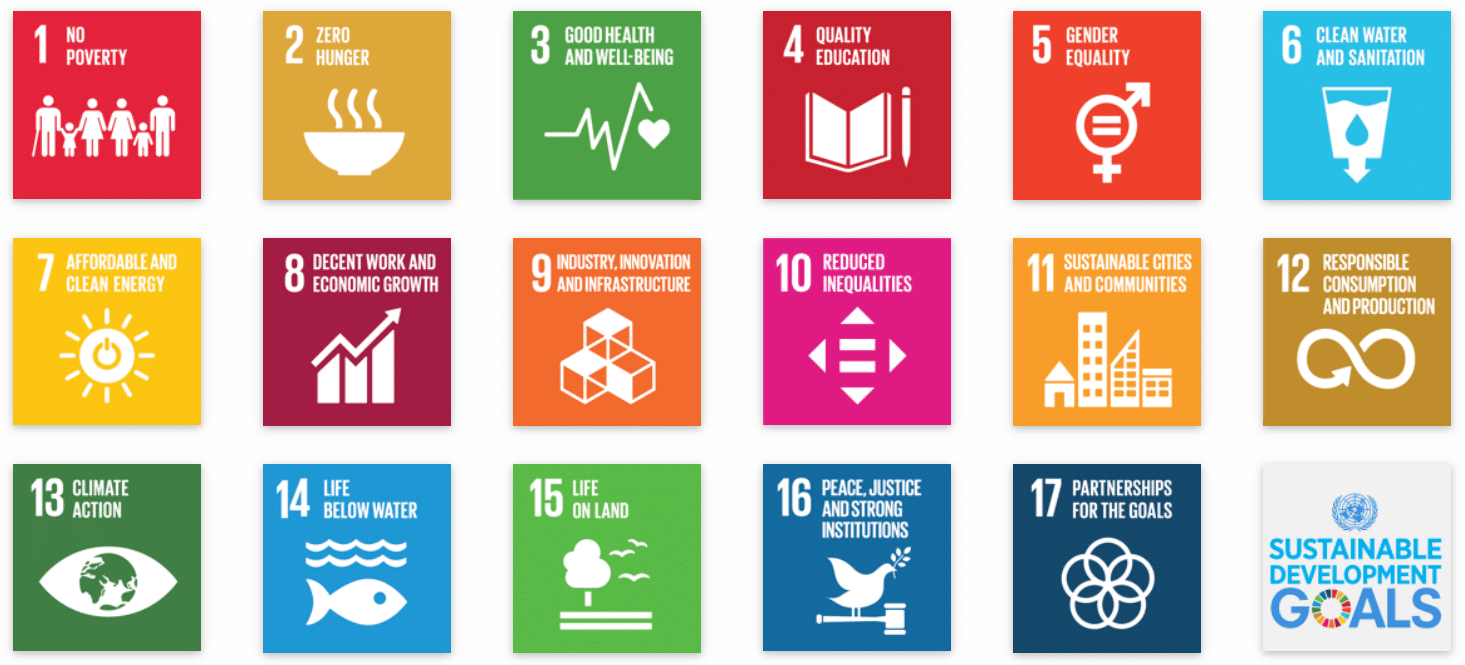
The 17 UN Sustainable Development Goals.
“In 2018, after working for various non-profits and think tanks for around 12 years, I decided it was time to start my own venture combining all my interests together,” said Chick.
“At that time, SDGs were not well known in Hong Kong, and [since they] encompass many of my interests, from environmental sustainability to reducing inequalities in society, I [was] able to leverage my years of experience in running experiential-learning programmes and put some of the fun elements into our workshops, such as climate change and coffee, biodynamic wine, fair-trade and chocolate, and even ecotours.”
You might also like: Why the Sustainable Development Goals for 2030 Are More Important Than Ever
Through a collaborative model, Encompass HK works with a large number of NGOs, Social Enterprises, universities, and schools to further its missions. In the last five years, it has held over 250 workshops and events such as talks and tours including the Green Women Festival, TEDxEncompassHK, and various SDG Young Influencer Programmes.
“I want to use easy-to-understand workshops to raise awareness of the SDGs for the Hong Kong community,” explained Chick. “I also want Encompass HK to be a social enterprise where we work collaboratively with different NGOs and build partnerships.”
The social enterprise’s workshops range from nature and city excursions that encourage city-dwellers to appreciate biodiversity in Hong Kong to experiential food programmes such as sustainable beer, coffee, and chocolate tastings. They focus on different topics, including gender stereotypes, the impacts of climate change, food waste, and the importance of supporting sustainable food practices and products. They are also a way to make people realise that SDGs are something “very tangible and not very remote,” Chick added.
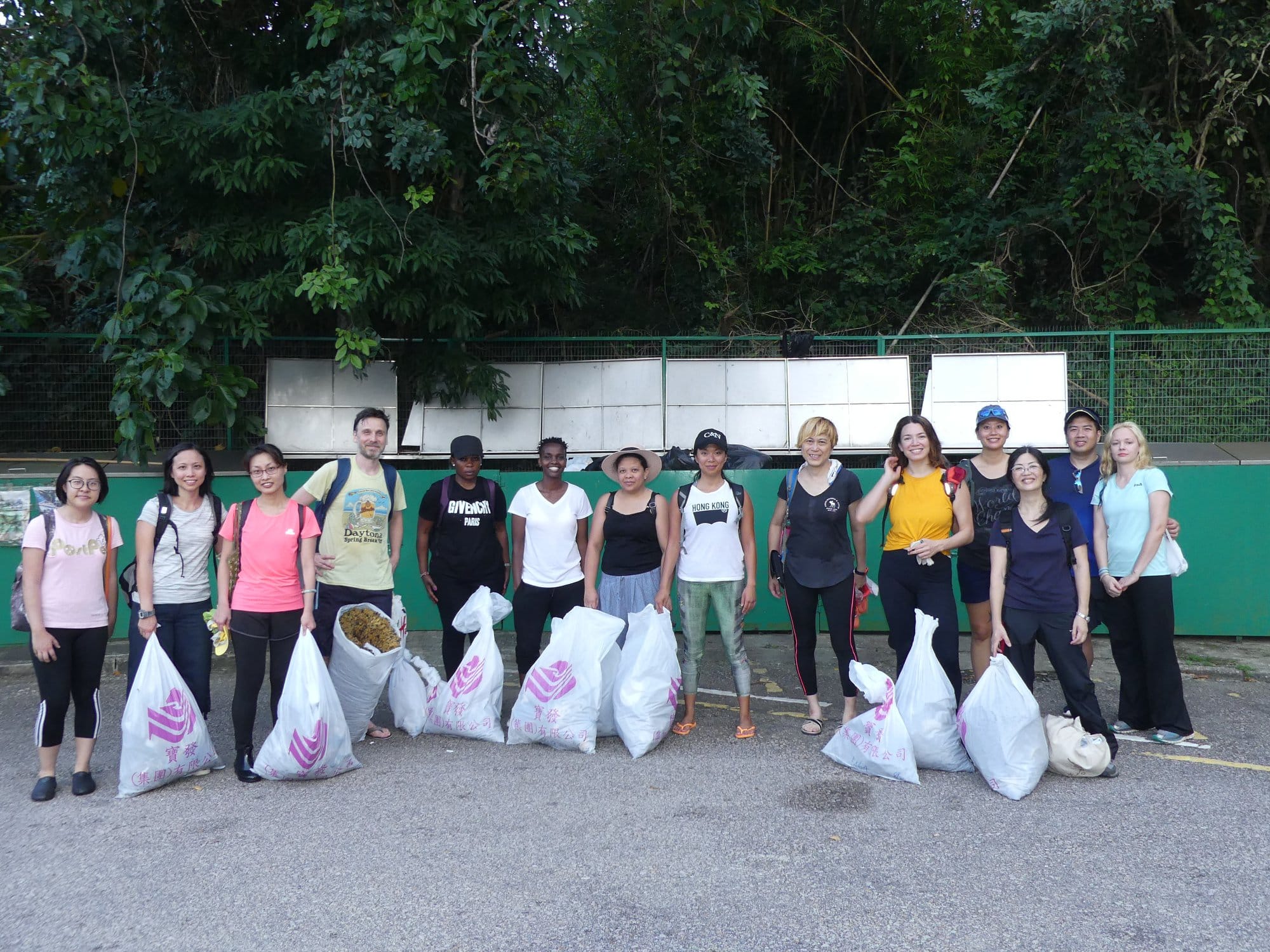
In Encompass HK’s ecotours, participants are invited to participate in clean-ups, a way to encourage the protection of the environment. Image courtesy of Encompass HK.
When asked about the purpose of her workshops, she admitted to being very surprised that SDG 12 – Responsible Consumption and Production – was perceived as the least important in Hong Kong despite its consumer-driven nature. Individual action can make a huge difference in terms of responsible consumption and production, she argues.
“As such, many of my programmes are related to consumer behaviour and SDG 12. Our aim is not to ask people not to consume things they enjoy in life, but rather to consume them in a more sustainable manner. While SDGs are big goals that seem difficult to accomplish, we want people to understand that their individual actions do make a difference. Every dollar they spend will make a difference in the world.”
Encompass HK Workshop: Sustainable Easter
“Chocolate and Easter are a perfect duo for making the celebration more profound,” says Chick.
Inspired by her goal to promote food sustainability, she came up with an innovative workshop idea to promote sustainable chocolate in time for Easter celebrations.
“This workshop makes people aware that chocolates are not just about the taste and food, but actually, its production is related to child slavery, gender inequality, supply chain issues, and environmental factors.”
According to UK-based NGO Less Waste, we buy a whopping 80 million chocolate eggs each year and over 4,300 tonnes of cardboard is wasted every year from Easter egg packaging.
But aside from waste, cocoa production is also infamously associated with inhumane practices and detrimental impacts on ecosystems and biodiversity, as Chick pointed out.
Chocolate comes from the pods that grow on cocoa trees, which are small plants that only grow in the tropics. Every year, approximately 4.7 million tons of cocoa are produced worldwide. About 70% of the global supply comes from West African countries including Ghana, Nigeria, Cameroon, and Côte d’Ivoire. Here, cocoa is linked to incredibly high rates of deforestation and biodiversity loss.
Much of today’s cocoa is grown in monocropping systems – an agricultural practice where a field is used for the production of pure stands of one crop only. This controversial technique is infamously known for reducing the availability of certain nutrients and degrading the soil, thus disrupting food systems. Furthermore, monoculture cultivation is often undertaken with a heavy reliance on pesticides and other chemicals which pollute the soil as well as waterbodies such as rivers and streams, threatening marine wildlife.
According to a report by the World Cocoa Foundation (WCF) and Mighty Earth, one-quarter of the Ivory Coast’s 300,000 acres of forests and 10% of Ghana’s tree coverage have been cleared for cocoa production between 2001 and 2014. In Indonesia, 1.7 million acres of forest were cleared for cocoa between 1988 and 2007, equivalent to 9% of the nation’s total deforestation for crops. Moreover, a staggering 40% of plantations are built illegally inside protected areas. This means that nearly 17% of the world’s yearly cocoa output is produced illegally.
Cocoa farming is also intertwined with human rights abuses and social challenges. According to Etelle Higonnet, Mighty Earth’s legal and campaign director, profits for a chocolate bar for cocoa farmers in the Ivory Coast have declined from around 16% to 3.5-6% between the 1980s and today. Because the price of cocoa has fallen so low, most cocoa farmers make less than a dollar a day. Female cocoa farmers make even less: only around 30 cents a day. Cocoa farming is also often associated with child labour, with around two million children estimated to work on cocoa plantations.
Learn more about the impact of cocoa farming on the environment here: How Does Cocoa Farming Cause Deforestation?
Encompass HK’s Easter chocolate-tasting workshop aims at inspiring people to “re-think the relationship between celebration and sustainability.”
“In these interactive workshops, participants can explore the origin, culture, and story behind chocolate and its association with love and Easter. We will explore the entire bean-to-bar process, all the way from the farmers who grow the cocoa beans right through to us.”
During the “Taste the Love in Chocolate and SDGs Workshop”, participants will experience the different “tastes” of fair-trade chocolate from a sustainable perspective, and gain a better understanding of the SDGs and their association with this important celebration.
“By learning about the SDGs, participants can think about the importance of Responsible Consumption and Production and how we can contribute to a better planet.”

Benita Chick, CEO and Founder of Encompass HK.
Individual Action Matters
The UN Sustainable Development Goals are shaped by some of the biggest environmental and social challenges of the modern world, from poverty, lack of sanitation, and social injustice to pollution and climate change. They highlight the broken structures of modern societies and shed a light on the complexity of pressing issues.
“Investing in a proper response to one Sustainable Development Goal can help us achieve many more others;” writes Lei Nguyen for Earth.Org. In fact, all 17 SDGs are deeply interconnected. If handled in an inclusive and climate-sensitive manner, recovery from this worldwide epidemic and economic slump might provide a significant opportunity for the betterment of the environment, public health, poverty reduction, and job creation.
In order to promote and encourage a global audience to recognise the vital role of individual action in shaping a better world, Futerra, the Sustainable Lifestyles and Education (SLE) programme under the 10-Year Framework of Programmes for Sustainable Consumption and Production (10YFP), developed The Good Life Goals. They lay out “85 ways anyone can contribute towards the huge, planet-changing objectives that sit at the heart of the SDG agenda.”
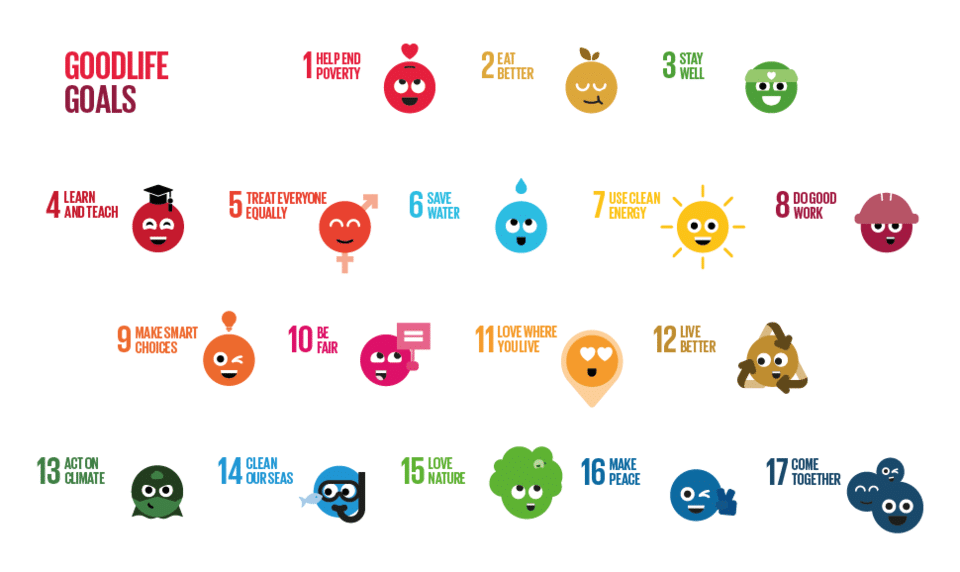
The 17 Good Life Goals.
While tackling problems like climate change is undoubtedly “a massive challenge”, as Chick depicts it, the SDGs, their sub-targets, and the Good Life Goals are there to remind us that even individual actions can make a huge impact.
Featured image courtesy of Encompass HK.
You might also like: Why the Sustainable Development Goals for 2030 Are More Important Than Ever








